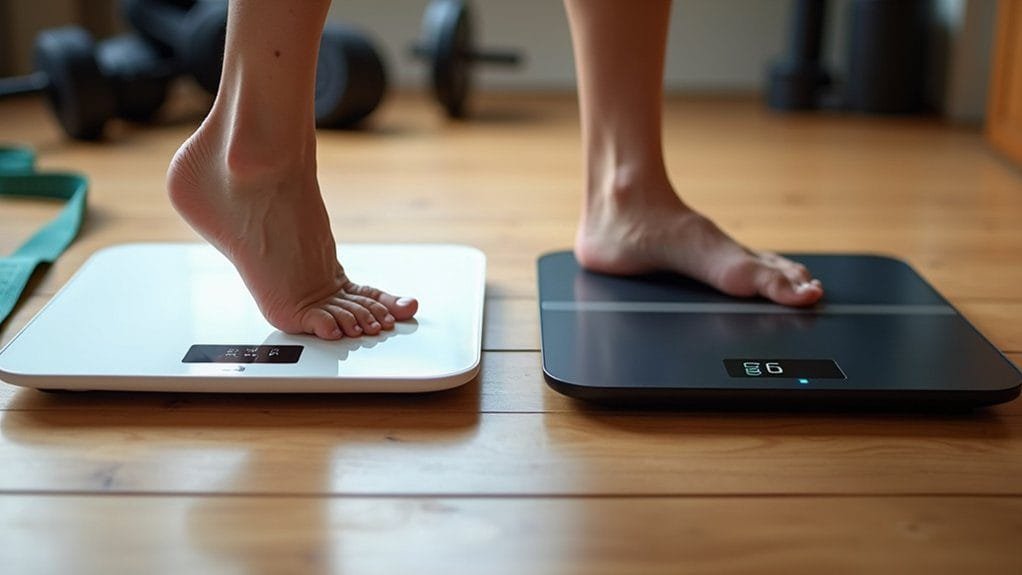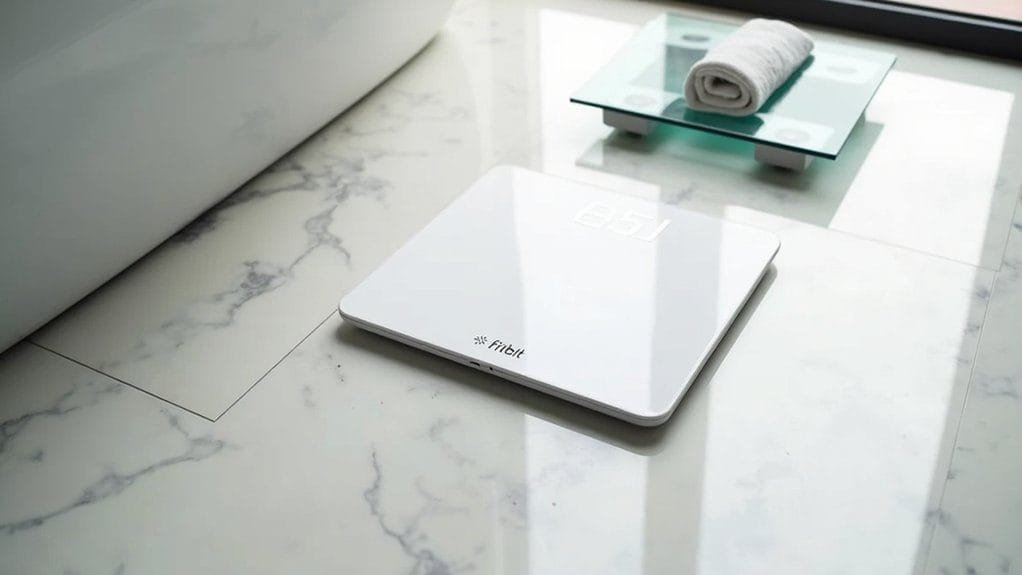When comparing smart scales for body fat tracking, you’ll find Withings outperforms Fitbit. Its advanced bioelectrical impedance analysis (BIA) technology delivers more precise body composition metrics across weight, body fat percentage, muscle mass, and water mass. You’ll benefit from Withings’ high-precision sensors and extensive health app integration, which provides deeper insights than Fitbit’s basic tracking. The detailed metrics make Withings the superior choice for understanding your body’s composition. Keep exploring to uncover the full technical breakdown.
Key Takeaways
- Withings Body Smart Scale offers more comprehensive body fat tracking using advanced bioelectrical impedance analysis (BIA) technology with greater reliability compared to Fitbit Aria Air.
- Withings provides detailed body composition metrics including body fat percentage, muscle mass, and water mass, while Fitbit primarily focuses on basic weight and BMI measurements.
- The Withings Health Mate app integrates with over 100 third-party health platforms and delivers more sophisticated data visualization and trend analysis for body fat tracking.
- Withings scales demonstrate higher precision in body fat measurement, with consistent results across multiple user tests and more advanced sensor technology than Fitbit.
- Despite being more expensive at $99 compared to Fitbit’s $49.95 model, Withings offers a more holistic and accurate approach to body fat tracking and overall health monitoring.
Understanding Smart Scale Technology


While technological advancements continue to reshape personal health monitoring, smart scales represent a significant leap in home fitness tracking. These devices employ bioelectrical impedance analysis (BIA) technology to estimate body composition metrics, sending a low-electrical current through your body to measure resistance and calculate body fat percentage. The accuracy of these measurements varies across different smart scales, with the Withings Body demonstrating more reliable results compared to some competitors. By connecting via Bluetooth or Wi-Fi, these devices allow you to sync health tracking data directly to smartphone apps like the Fitbit app, enabling thorough body composition analysis. Your user experience depends on the scale’s precision, data sync capabilities, and the depth of insights provided by the associated health tracking platform.
Withings Body Smart: Features and Performance
Because precision matters in health tracking, the Withings Body Smart scale delivers a thorough body composition analysis that goes beyond basic weight measurement. Its advanced tracking capabilities provide users with extensive insights:
- Measures weight, BMI, body fat percentage, muscle mass, and water mass
- Enables automatic data syncing via Wi-Fi to the Health Mate app
- Supports multiple user profiles, recognizing up to eight unique individuals
- Integrates seamlessly with over 100 third-party health apps like Apple Health and Google Fit
Priced competitively at $99, the Withings Body Smart offers high-precision sensors for accurate weight measurements. Its sleek design and robust technological features make it an attractive option for health-conscious individuals seeking detailed body composition tracking without compromising budget or performance. The scale transforms raw data into actionable health insights.
Fitbit Aria Air: Design and Functionality


Where the Withings Body Smart offers thorough body composition analysis, the Fitbit Aria Air takes a more streamlined approach to digital weight tracking. Its compact 11.8 x 11.8 inch design comes in black and white, positioning itself as a minimalist Bluetooth-enabled smart scale for basic weight monitoring.
| Feature | Specification |
|---|---|
| Connectivity | Bluetooth |
| Metrics | Weight, BMI |
| Design | Rounded corners |
| Color Options | Black, White |
| Price | $49.95 |
You’ll find the Fitbit Aria Air’s user-friendly app allows convenient weight tracking, though it requires active app engagement for data transmission. While limited in body composition metrics, the scale delivers straightforward functionality. Its Bluetooth synchronization means you’ll need proximity to your device, making it less seamless than Wi-Fi alternatives. For users seeking fundamental weight tracking without complex measurements, the Aria Air offers an accessible, budget-friendly solution.
Comparison of Body Composition Metrics
When comparing body composition metrics between the Withings Smart Body Analyzer and Fitbit Aria Air, users will discover a significant disparity in tracking capabilities. Key differences include:
- Withings offers extensive body composition metrics using bioelectrical impedance analysis (BIA) technology
- Fitbit Aria primarily tracks weight and body fat percentage
- Withings’ health apps provide more detailed trend visualization
- Withings’ estimate body fat measurements demonstrate greater consistency and reliability
The Withings Smart Body Analyzer stands out by delivering a more holistic approach to tracking body composition. Its advanced technology captures multiple health indicators beyond basic weight measurements, including lean mass, water weight, and heart rate. While Fitbit’s app offers limited tracking, Withings’ app empowers users with in-depth insights into their physical health, making it a superior choice for those seeking extensive body composition analysis.
Accuracy and Precision Testing
While precision in body composition measurement is essential for tracking fitness progress, the Withings Smart Body Analyzer distinguishes itself through superior accuracy testing protocols. Utilizing advanced bioelectrical impedance analysis, the Withings scale demonstrates more consistent measurements compared to the Fitbit Aria, with a three-week study revealing minimal variability in body fat tracking.
The thorough dashboard offers users detailed health insights, enabling precise monitoring of body composition changes. Withings’ technology excels in measuring lean mass and body fat with greater reliability, providing a more nuanced understanding of health metrics. Unlike the Fitbit Aria’s occasional inconsistent readings, the Withings scale delivers a more technically robust user experience, making it the preferred choice for individuals seeking accurate and thorough body composition tracking.
App Integration and User Experience
Although app integration plays a crucial role in smart scale functionality, the Withings Smart Body Analyzer and Fitbit Aria diverge markedly in their digital ecosystem approach. Consider these key differences in app integration and user experience:
- Withings offers an extensive dashboard with visualization of weight data and integration with over 100 third-party health apps
- Fitbit provides basic weight tracking with the ability to set target weights
- Withings’ Health Mate app delivers significant health insights and multi-user tracking for up to eight users
- Fitbit’s app focuses primarily on fundamental weight tracking without advanced body composition analysis
The Withings Smart Body Analyzer demonstrates superior app integration, delivering more actionable insights and a richer user experience. While Fitbit’s solution remains functional, it lacks the depth and contextual understanding provided by Withings’ sophisticated digital platform, potentially limiting users’ ability to thoroughly track and understand their health metrics.
Price and Value Proposition
In the competitive landscape of smart scales, pricing and value proposition emerge as critical factors for consumers weighing their purchase options. At $99.95, the Withings Body+ offers advanced body composition metrics and superior accuracy, justifying its higher price point. You’ll find the Fitbit Aria Air more budget-friendly at $49.95, though its limited health metrics might compromise detailed tracking. Your investment considerations should balance thorough body fat tracking capabilities against immediate cost.
For budget-conscious users, the Fitbit Aria Air provides basic weight monitoring. However, if you’re seeking precise body composition insights, the Withings Body+ delivers more substantial value through its unique position aid technology and extensive metric tracking. Your choice ultimately depends on how deeply you want to analyze your body’s health data versus managing initial purchase expenses.
Choosing the Right Smart Scale for Your Needs
Beyond initial price considerations, selecting the right smart scale demands a strategic approach tailored to your specific health monitoring requirements. Consider these critical factors:
- Metrics Offered: Evaluate the depth of body fat and health data tracking across Withings and Fitbit scales.
- Connectivity Options: Assess Bluetooth and Wi-Fi capabilities for seamless data synchronization.
- App Functionality: Compare user interfaces and integration potential with third-party health platforms.
- Accuracy and Reliability: Prioritize scales with proven precision in body composition measurements.
Your ideal smart scale should align with personal fitness goals, technological preferences, and budget constraints. Withings scales excel in extensive metrics, while Fitbit offers more budget-friendly solutions. Ultimately, the right choice depends on balancing technical specifications, user experience, and individual health monitoring needs.
Frequently Asked Questions
Is the Withings Scale Accurate for Body Fat?
You’ll find the Withings scale provides consistent weight tracking, but its body fat measurement isn’t clinically precise. It’s best used for trend monitoring, leveraging smart app integration and bioelectrical impedance technology with realistic expectations.
Is There a Fitbit Scale That Measures Body Fat?
You’ll find the Fitbit Aria Air and Aria scales measure body fat using bioelectrical impedance analysis. These smart devices sync seamlessly with Fitbit’s app, offering fitness enthusiasts convenient body composition tracking through cutting-edge health technology.
How Accurate Are Withings of Visceral Fat?
You’ll find Withings’ visceral fat measurements are estimates based on BIA technology, offering insights into body composition with moderate accuracy. While helpful for fitness tracking, these smart scale readings should be interpreted alongside professional health assessments.
Which Body Fat Scales Are Accurate?
You’ll find smart scales vary in accuracy, with Withings Body+ offering superior body composition metrics and precise measurement techniques. Consider mobile app integration, connectivity, and health tracking benefits when selecting a scale that meets your precise body fat monitoring needs.
Do Smart Scales Provide Accurate Body Fat Measurements That Can Aid in Weight Loss?
Smart scales effectiveness can vary, but many users find them helpful in monitoring body fat percentages. These devices utilize bioelectrical impedance to estimate body composition, providing insights that can motivate weight loss. Understanding their readings, however, is crucial; they should complement a balanced diet and exercise routine for the best results.
Conclusion
When choosing between Withings and Fitbit smart scales, you’ll want to weigh your priorities carefully. Both devices offer robust body composition tracking, but their nuanced differences might sway your decision. Like a trusty telegraph transmitting data, these scales provide precise metrics. Your individual health goals, budget, and ecosystem preferences will ultimately determine the most suitable option. Invest wisely in a scale that seamlessly integrates with your wellness journey.
